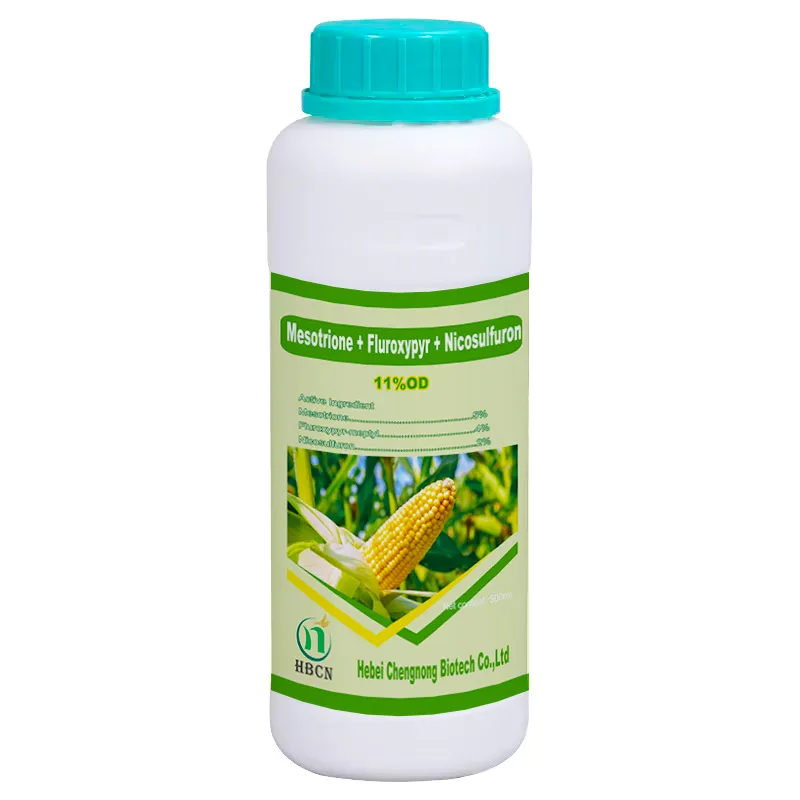
Jan . 06, 2025 11:16 Back to list
mesotrione
Mesotrione is a selective herbicide widely recognized for its efficiency in managing broadleaf weeds and certain grassy weed species in agricultural settings. Originally inspired by the natural phytotoxin leptospermone found in the bottlebrush plant, mesotrione is meticulously engineered to provide optimal herbicidal action while maintaining a favorable safety profile for both crop and environment.

From a product perspective, mesotrione's value is grounded in its mode of action. It inhibits p-hydroxyphenylpyruvate dioxygenase (HPPD), an enzyme crucial for carotenoid biosynthesis in plants. This inhibition leads to bleaching symptoms and eventually the death of susceptible weeds due to the destruction of chlorophyll. Its unique mechanism offers a new line of defense against herbicide-resistant weed populations, which have increasingly challenged global agriculture.
Applying mesotrione requires a nuanced understanding of both the product itself and the specific agronomic environment in which it is used. Farmers and agronomists favor its flexibility; mesotrione can be used in a variety of crop systems, including corn, sorghum, and sugarcane. Its compatibility with other herbicides enhances its robustness, permitting integration into numerous weed management strategies without compromising crop safety.

Professionals in the field of crop management report varied experiences with mesotrione. For instance, a farmer in the Midwest United States utilized mesotrione as part of a broader integrated pest management (IPM) strategy and noted not only effective weed control but also an appreciable increase in crop yield. This illustrates mesotrione's role not just as a weed control agent, but as a factor contributing to overall agricultural productivity when used correctly.
mesotrione
However, applying mesotrione isn’t without its challenges. Experts note that adherence to recommended application rates is critical, as over-application could cause unintended phytotoxicity to sensitive crops. An agronomist shared an incident where deviation from suggested doses resulted in crop damage, underscoring the importance of precision in herbicide application. Educational programs and detailed labeling play crucial roles in mitigating such risks, ensuring users can leverage the herbicide’s benefits without compromising crop health.
Authoritative industry body studies affirm mesotrione's efficacy and safety. Regulatory approvals from entities such as the US Environmental Protection Agency further establish its credentials, reflecting widespread confidence in its use. These endorsements are augmented by ongoing research efforts aimed at refining its utilization and expanding its applicability to diverse agronomic conditions.
Trust in mesotrione as a constituent of crop management is multifaceted. Manufacturers prioritize rigorous quality control measures, ensuring consistent product delivery. Additionally, they engage in comprehensive outreach initiatives, educating end-users about best practices in weed control, which enhances user confidence in achieving optimal results without adverse impacts.
In conclusion, mesotrione presents a balanced integration of modern herbicidal technology with pragmatic crop management, reinforced by empirical evidence from experienced agricultural practitioners. It is a testament to the evolving landscape of agricultural sciences, where innovation meets practical application to support sustainable farming practices.
-
Powerful Fungicide for Optimal Crop Health & Yield Protection
NewsAug.23,2025
-
Azoxystrobin Fungicide: Advanced Crop Protection Solutions
NewsAug.22,2025
-
Willowood Imidacloprid: Best Broad-Spectrum Insecticide Solution
NewsAug.22,2025
-
Atrazine Herbicide: Selective & Effective Weed Control for Sale
NewsAug.21,2025
-
Azoxystrobin: Broad-Spectrum Fungicide Solutions
NewsAug.11,2025
-
Best EPA Boscalid: Superior Crop Fungicide for Max Yields
NewsAug.11,2025
